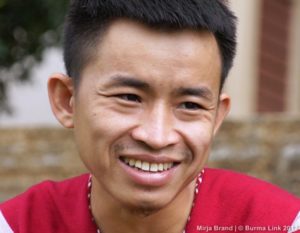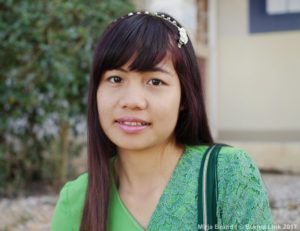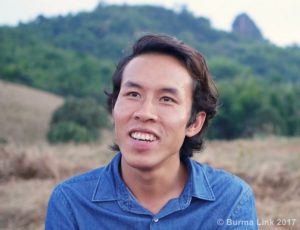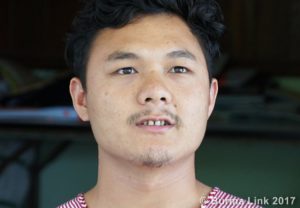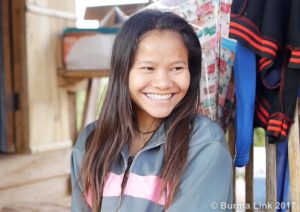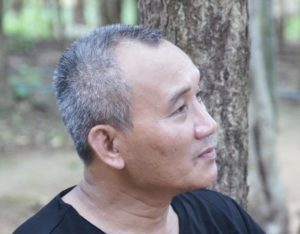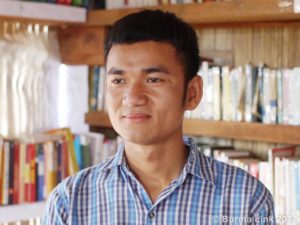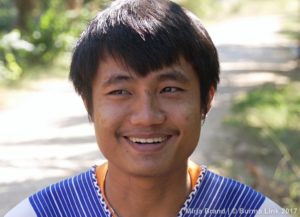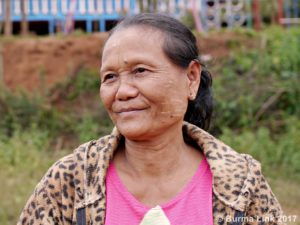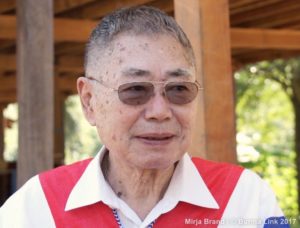My dream for the future of Burma is for all ethnic people to live together peacefully. So many other countries have good policies and good governments, so now is the time for Burma to become like that too.
Saw Say Moo
Saw Say Moo is a 27-year-old ethnic Karen refugee from Bu Thaw Ta village in the Mu Traw district of Karen state. Ever since he was born, Say Moo has had a challenging life. With his two siblings and his parents, both farmers, Say Moo had to continually flee from his village to escape the fighting between the Burma Army and the Karen National Union (KNU). Escape for him and his family was by foot several hours into the jungle. Say Moo remembers sleeping in a bamboo hut that his parents built, but it lacked a proper roof. They arranged leaves above them for some shelter, but the rainy season was a difficult time. There was also another 2-room bamboo hut that served as their school in addition to a separate hut for the children to use for their studies. Sometimes, though, Say Moo and other children just studied in the jungle with no shelter.
Whilst armed conflict and displacement was an ongoing challenge, for Say Moo the biggest struggle of all was for education, and villagers made every effort to continue to provide schooling in unimaginable circumstances. As the fighting raged on, Say Moo’s family and other villagers stayed in the jungle for years, too afraid to return to their farm. They built a life for themselves along a river in the jungle, cultivating whatever they could to survive. Finally in 2004, the fighting ceased for a while and the family returned to their farm. Back in the village, the village chief and parents worked hard to find a teacher, though they still had no access to textbooks. While studying grades 3 and 4, Say Moo and his classmates had no books at all for their studies, and although the teacher was later able to secure textbooks, they were usually not at the students’ grade level. In the village, Say Moo was able to study up to grade 6.
When Say Moo was 17, he moved to Mae La Oon refugee camp to continue his studies. After finishing grade 12, he moved to Mae La refugee camp, the biggest of the camps along the Thai border, and a centre for education. There he was able to study at Leadership and Management Training College (LMTC), one of the post-ten schools in the camp. Once there, he studied a Science Major for the first two years and English Major for another two years. In 2011, during his second year at LMTC, Say Moo became a member of KSNG. After completing LMTC, Say Moo taught for two years, at No. (5) high school in Mae La refugee camp and another year at the Kaw Moo Ra School on the border of Karen State and Thailand. After those two years, KSNG held an election and voted for Say Moo to come back and work at the KSNG Center as the Publication Editor for Student Friends’ magazine. He now leads student groups of political and educational activists and shares information with those in the camps and in Burma as well.
Among Say Moo’s most important hopes for refugees is getting their education recognized, which would lead to more opportunities. Even though his education is not yet recognized, he sees how school has helped him become more competent and confident and wants to open more doors for other refugees as well. His work with KSNG is something else he is rightly proud of as it has given him travel opportunities and exposure to make a difference with the next generation.
For me, if there is no fighting, no guns, we live freely for our livelihood and we own our land and animals, it is called peace. We want to live quietly without quarreling, managing everything by ourselves and developing ourselves.
Naw Lay Lit Ray Thaw
Naw Lay Lit Ray Thaw comes from a Karen village in a non-government controlled area of Karen National Union (KNU) Brigade 6 in Karen State, southeast Burma, where she grew up with her parents and three siblings. Lay Lit is now 26 years old and takes responsibility as the Secretary of the Karen Student Network Group (KSNG).
Every year, as part of KSNG activities, Lay Lit celebrates World Peace Day in a new place. Last year, she organised the celebration with nine of her KSNG colleagues for over 1,000 residents from 10 villages in KNU Brigade 2. Lay Lit and her team hosted World Peace activities, such as debates, improv speeches, poetry competitions and sports, at these annual events. She thinks that these activities are important tools to help explain that peace isn’t about just one ethnic group, but rather about unity and every ethnic group.
Speakers at this year’s World Peace event included various Karen leaders, members of the Karen Women’s Organization (KWO), the District Chairman, village chiefs, and local citizens, among others. All speakers shared their thoughts about and commitments to peace. The message of peace is so important to Lay Lit in large part because of all the fighting she experienced in her village as a child. She fondly remembers a peaceful early childhood in her small village. Once the Burma Army soldiers came, when she was 7 or 8 years old, they killed villagers and farm animals. Lay Lit and her family had no choice but to flee. She especially remembers how difficult their escape was; they had to face dangerous river crossings on foot, torrential rains and sleeping in whatever accommodation they could find. She quickly grew to be afraid of dying.
In time, Lay Lit and her family were able to move back to her village, but it was never permanent. Burmese soldiers would sporadically return and torture the locals. Sometimes the men were taken as porters for the army; some men who were taken never returned.
While in her village, Lay Lit enjoyed going to school. Her village school only went to grade 4. At this time, when she was about 10 years old, she moved to Nu Po refugee camp to live and continue her studies. She started grade 5 soon after arriving at the camp. The main difference between her village school and the camp school was how teachers in the camp encouraged critical thinking and creative expression; these are skills that Lay Lit is grateful to have now as an adult. Over the course of her school years, she upheld good study habits, did well in classes and developed strong ambitions for her future. After graduating grade 12, she wanted to go to the IHE PDJC (Institute of Higher Education Pu Dooplaya Junior College) school, but she couldn’t afford school fees. She spent the following year working as a teacher and saving her income before she became a student at IHE PDJC. She later graduated also from the Wide Horizons community development school in Mae Sot.
World Peace Day is a very important day to Lay Lit. She wants to, of course, promote peace for the future, but she also thinks that it’s important to share the stories of her past. It’s difficult for her to forget her experiences, and at the same time, it’s critical for her to share these stories with the next generation so that today’s youth can work towards a peaceful Burma. Even though the education Lay Lit has received in the camps is not recognised, she is grateful for having learned in the camp. One of Lay Lit’s biggest dreams is telling her mother about the education she has received in the refugee camp.
In the future, what I want for Burma is unity … To be like this, all ethnicities should be in harmony. It is about Federalism, if the policy to govern their own states is given, I believe that the road to peace will be upon us.
Khun Tu Tu Lay
Today, 23-year-old Khun Tu Tu Lay is a high-achieving student, but this was not always the case. He is an ethnic Kayan who grew up in a village called Sii-Bu in Karenni State adjacent to Mae Hong Song Province in Thailand. Khun Tu Tu Lay’s family is made up of his parents and a total of 5 children. His small village on the mountains offered only 1.5 hours of electricity for homes per day, limiting children’s study hours. His parents were farmers and money was tight. Combined, these factors made it difficult for him to reach his potential in school.
The place where Khun Tu Tu Lay is from is also the central headquarters of Kayan New Land Party (KNLP), the main ethnic Kayan armed actor. Although KNLP had signed a ceasefire with the central government before Khun Tu Tu Lay was born, the area was militarised and guns were nothing strange to young Khun Tu Tu Lay who grew up hearing stories of killings and shootings.
Overall, his childhood was happy. Khun Tu Tu Lay was like any other child, content to play, eat and sleep. When it came to school, though, things weren’t so simple. He attended school in the village from kindergarten to 8th standard, but it was difficult for him because he did not have the money for tuition classes. In Burma, teachers usually have to resort to offering paid tuition classes for the students in order to make additional income. Students who are unable to pay for the tuition have difficulties passing exams as teachers often make sure to give necessary information in tuition classes only. Without the tuition classes, students are likely to fail. This is exactly what happened to Kyun Tu Tu Lay.
He tried, unsuccessfully, to pass the 10th standard, which would have given him a recognised school graduation certificate. Instead of giving up hope, though, Khun Tu Tu Lay sought new opportunities and found a teacher training program that he hoped would lead to job skills and opportunities down the line. The course lasted one month and then he taught for one year in a remote Karen village. Students in the village hadn’t had a teacher in 2 years. The school building was just a temporary structure, but Khun Tu Tu Lay made the most of it and put his heart into teaching his students. The reason that he accepted this position in the village in the first place was because he heard about the dire need and the inability to find another teacher for the village. He said it was necessary to become a teacher as he thought it was unfair for those kids to be denied an education. At once, he decided that the right thing for him to do was to go teach in the village.
After one year of volunteer teaching, the Kayan New Generation Youth (KNGY) organisation opened a English and Computer training program for two months and accepted the volunteer teachers as a way to pay them back. In this way, Khun Tu Tu Lay was able to continue his education at no cost. He took some political classes and became very interested in getting involved in politics. Following this initial class, he attended a political training for 6 months, learning about topics such as human rights and democracy. It was at this point that Khun Tu Tu Lay committed himself to building educational opportunities for youth in remote villages as he strongly feels that education is a basic, yet critical, human right.
These days, Kyun Tu Tu Lay is studying at English Immersion Program (EIP) and loving it. EIP has helped him find his voice, not just in English, but with a wide variety of other useful skills. His classmates are from variety of ethnic groups, yet everyone gets along. He hopes that he can continue educating youth and help all of Burma’s people to get along as well as him and his cross-cultural classmates do.
Who are these young unrecognised leaders from Burma/Myanmar? Click on their names to read more.
Who else is in the film?
Saw Bless
Saw Bless is from a multi-ethnic village in Taungoo, Karen National Union (KNU) Brigade 2. Being a child who frequently got into trouble and had no goals or plans for his future, Saw Bless has come a long way. Things started changing for Saw Bless after he started going to school ran by the Karen Education Department (KED), education department by the KNU, and had a chance to learn about the history, culture and the conflict in Burma. These topics inspired him, so at the age of 16, Saw Bless followed his passion and joined the revolution. In 2007, he became a member of the KYO Congress. Saw Bless later became the KYO secretary and is now in KYO’s Alliance Affairs division. He works hard to help achieve equality and peace in Burma, while promoting youth education. Saw Bless is also a CEC (Central Executive Committee) member of the recently established National Ethnic Youth Alliance (NEYA), which advocates for youth inclusion in the peace process.
Naw Ku
Naw Ku is a former high school teacher and now a student. She studies at English Immersion Program (EIP) to further develop her English skills. EIP requires students to speak English 24 hours a day as a means to achieve fluency. In addition to language studies, Naw Ku and her classmates learn about community development and teaching strategies. She is very grateful for her education and is looking forward to putting her new skills to use in a career in education, management or interpretation. In fact, she worked as a volunteer interpreter and transcriber/translator on this documentary.
General Baw Kyaw Heh
Over the years, General Baw Kyaw Heh, Vice Chief-of-Staff of the Karen National Liberation Army (KNLA), armed wing of the KNU, has been defending the Karen State and fighting for peace for a long time. The General was a graduate of KNLA’s first Commando Battalion. He also fought in several major battles and was primarily involved in special operations to take enemy outposts by surprise or block enemy supply lines and reinforcements. He is in charge of the KNLA Brigade 5 located deep in the jungles of northern Karen State. Over the years, he has seen many efforts to find peace in Burma come and go. Even so, he hasn’t given up hope that it is still attainable. The key to achieving peace in Burma, he says, is for ethnic groups to stay strong and united.
Saw Klee K'Paw
As a child, Saw Klee K’Paw’s education didn’t come easy. He studied in his village until Grade 4. After that, fighting broke out in his village, and he and his family had to flee. For the next few years, he studied on and off in a refugee camp and back in his village. He completed up to Grade 9 before taking a Teacher Preparation Course and then beginning his teaching career. Despite being only 27 years old, Klee K’Paw is now the Headmaster at English Immersion Program (EIP). Before his current post, he was a teacher, a teacher trainer and an EIP graduate. He has experienced first-hand how EIP and the skills he learned there can open doors and create opportunities. Besides English language skills, the skills he feels are most important for students are teaching, critical thinking, project design, leadership, and community development. Other advantages to studying at EIP are the international focus and the cross-cultural student body. Klee K’Paw understands the value of a good school and the future opportunities that arise for graduating students, and he hopes to see more doors open for students in Burma.
Saw Htoo Htoo Stin
As the President of the Karen Student Network Group (KSNG), Saw Htoo Htoo Stin has an important role in shaping the future of the youth of Karen State. He and the KSNG organization are committed to creating educational opportunities that will empower the next generation and prepare them to be tomorrow’s leaders. One of the programs that Htoo Htoo is most proud of is the “Youth Exchange,” which unites youth within refugee camps and the Karen State. This helps the youth see each other’s similarities and at the same time, accept their differences. Other valuable lessons that the program teaches are in leadership and politics. Htoo Htoo feels that education is the most important topic to address, with job opportunities, drugs and political changes following closely behind it. While Htoo Htoo does all he can to provide opportunities for today’s youth, he feels that finding good opportunities will continue to be a difficult challenge as long as ethnic groups don’t have fair and equal access to education, health, and employment.
Naw Wah
Naw Wah is committed to improving the lives of a great number of people. First, she has the residents of Karen State’s T’wal Thaw village, of which she is the Village Chief. Then she works for a village tract, which overlooks an additional 12 communities. She uses her leadership role to try to improve the lives of local residents. She encourages students to study at EIP, which she sees as a source of strength and unification. Before EIP, few citizens in the area could read or write as it was difficult to find a qualified teacher. Now, though, youth are finding opportunities that Naw Wah’s generation didn’t have and she is proud of young people today who are studying and creating brighter futures for themselves and their communities.
Padoh David Tharckabaw
Padoh David Tharckabaw joined the resistance movement nearly seven decades ago when he was only 14 years old. Due to his young age, Padoh David joined without the knowledge of his parents and had to lie about his age in order to join the armed resistance. Padoh David has dedicated his life for the cause ever since. After 4 years of fighting with arms, the resistance leaders allowed the underage soldiers to leave for further education. He headed for Yangon, where he lived with relatives and continued his education. He later moved back to Karen State to once again help with the resistance and work towards a peaceful democracy. Today, Padoh David is the head of Karen National Union’s (KNU) Alliance Affairs Department. For decades, he has worked in close collaboration with Burma’s ethnic nationalities, holding many positions in politics, including Vice President of KNU, Vice Chairman of the armed ethnic alliance UNFC (United Nationalities Federal Council), and Head of the NCUB (National Council of the Union of Burma). The NCUB was an opposition organisation composed of representatives of armed groups and exiled political organisations that was formed in 1992 and aimed to achieve a democratic federal system in Burma. As the struggle for a federal system and lasting peace still continues today, Padoh David encourages today’s youth to study hard about Burma’s history and political situation, learn foreign languages, get active in politics and work towards a federal system and a genuine democracy. Padoh David Tharckabaw is a vocal advocate for ethnic unity and a unified and coordinated resistance.
